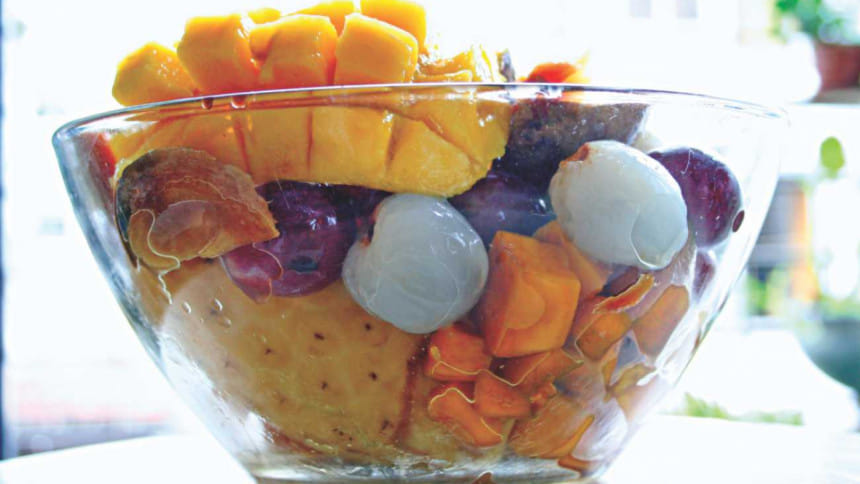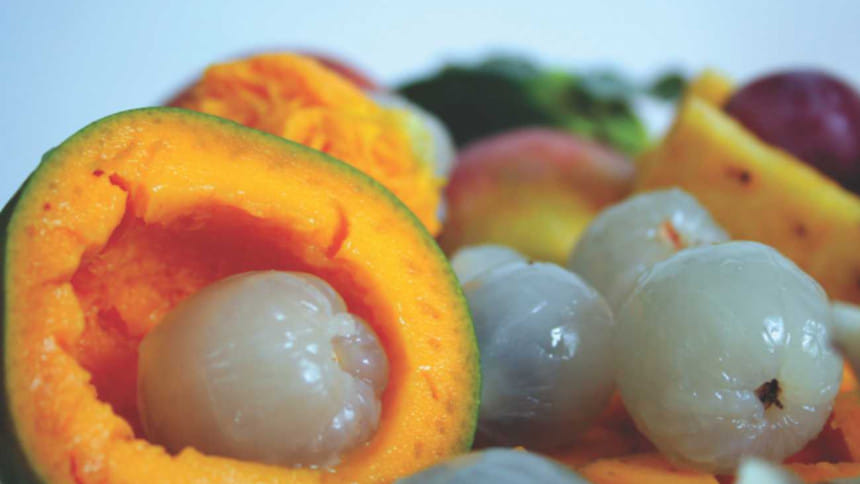Benefits of the mango

The origins of this much loved fruit can be traced back almost 4000 years. In the millennia that followed, the Southeast Asian mango has spread to many parts of the tropical and sub-tropical regions, where the climate suits its growth.
The fruit is not only wholesome but also a nutritional powerhouse. The average mango (250g) contains:
1.5g protein
1g fat
30g carbohydrates
3g carotenes (a single mango supplies more than the daily need of this precursor of vitamin A)
110g vitamin B1
125g vitamin B2
2 mg vitamin B3
90mg vitamin C
30mg calcium
45mg magnesium
1mg iron
295g zinc
0.5g potassium.

Mangoes are considered 'high volume' food — low on calorie but quite high in natural sugar. A single, small size mango can provide a quarter of the recommended daily dose of vitamin C; nearly two thirds of the daily requirement for vitamin A, along with a generous amount of vitamin E and fibre. It is also considered a rich source of vitamin K, phosphorus, magnesium and iron.
Addition of mango in the menu can help people recover from anaemia, a disease associated with low iron content in the body. The vitamin C, present in abundance in the fruit, enhances the absorption of iron and thus goes highly recommended for vegetarians, who shun away from meat and other animal products as a source of iron.
Generally, post-menopausal women suffer from weakness and their diet should include generous helpings of various fruits. It is recommended that a pregnant woman eat at least one mango a day; the calcium and the magnesium relaxes the muscles, relieves stress, and even prevents miscarriages.
Mango is an excellent natural source for pro-vitamin A which plays an important role in the development of the placenta and the foetus. It influences the growth, the metabolism of skin, mucus membranes, teeth and retina of the unborn child.
The high level of soluble dietary fibre in mangoes, along with pectin and the vitamin C, helps to lower serum cholesterol levels, specifically the Low-Density Lipoprotein (LDL). High on fibre content yet low on calories, fat and sodium only a few other fruits are as nourishing.
Mangoes can also help reduce the risk of developing hypertension. For the physically active, whether working out or constantly on the go, they are a great way to replenish that lost potassium.
Recent studies suggest that this fruit is a powerful cancer-fighter. There is a strong link between eating lots of fibre and a lower risk of cancers of the gastrointestinal tract. The phenols have healing and cancer-preventing capacities. The antioxidants help neutralise free radicals, which can damage otherwise healthy cells and lead to cardiac diseases, cancer, premature aging and degenerative diseases.

The enzymes and bio-active elements can help relieve indigestion. The enzymes clean the bowel and are an ideal antidote for all toxic effects inside the body. They provide also sufficient resistance to fight any germs and afflictions.
In children, mangoes not only serve as a popular fruit, but can also help those who struggle to concentrate. The glutamine acid boosts memory and keeps cells active. Mangos also contain a lot of tryptophan and the precursor of the "happiness-hormone" serotonin! And, finally for the beauty conscious, the fruit contributes to skin health and can clean clogged pores causing acne.
Photo: LS Archive

 For all latest news, follow The Daily Star's Google News channel.
For all latest news, follow The Daily Star's Google News channel. 



Comments